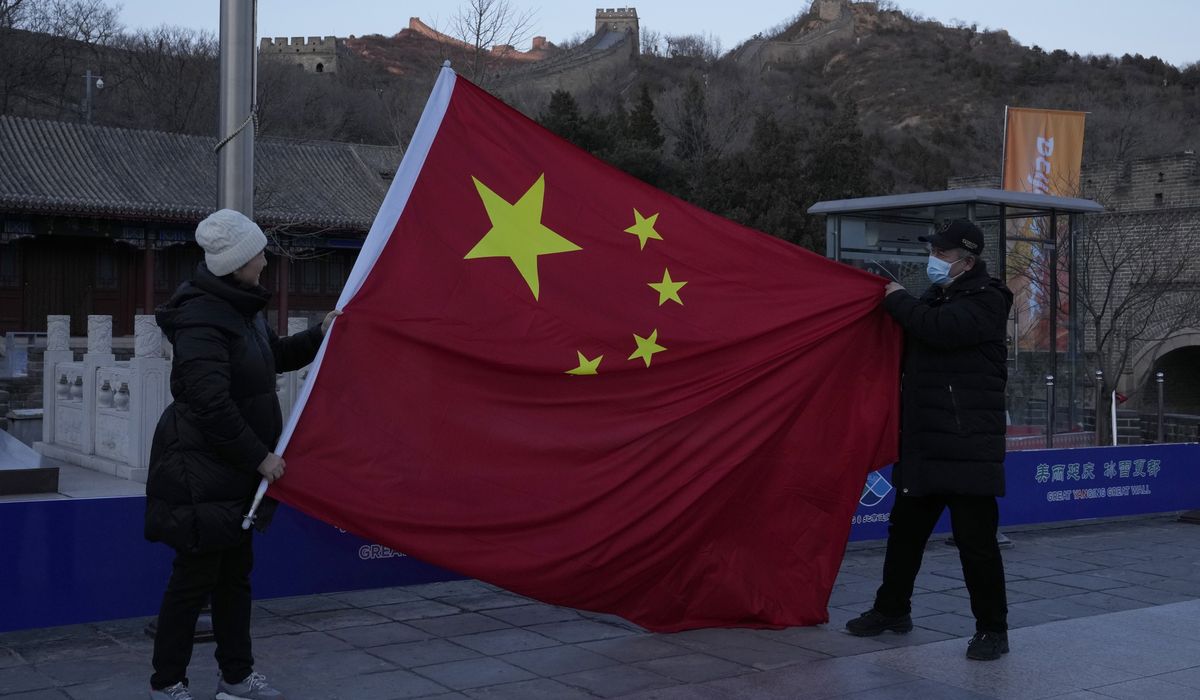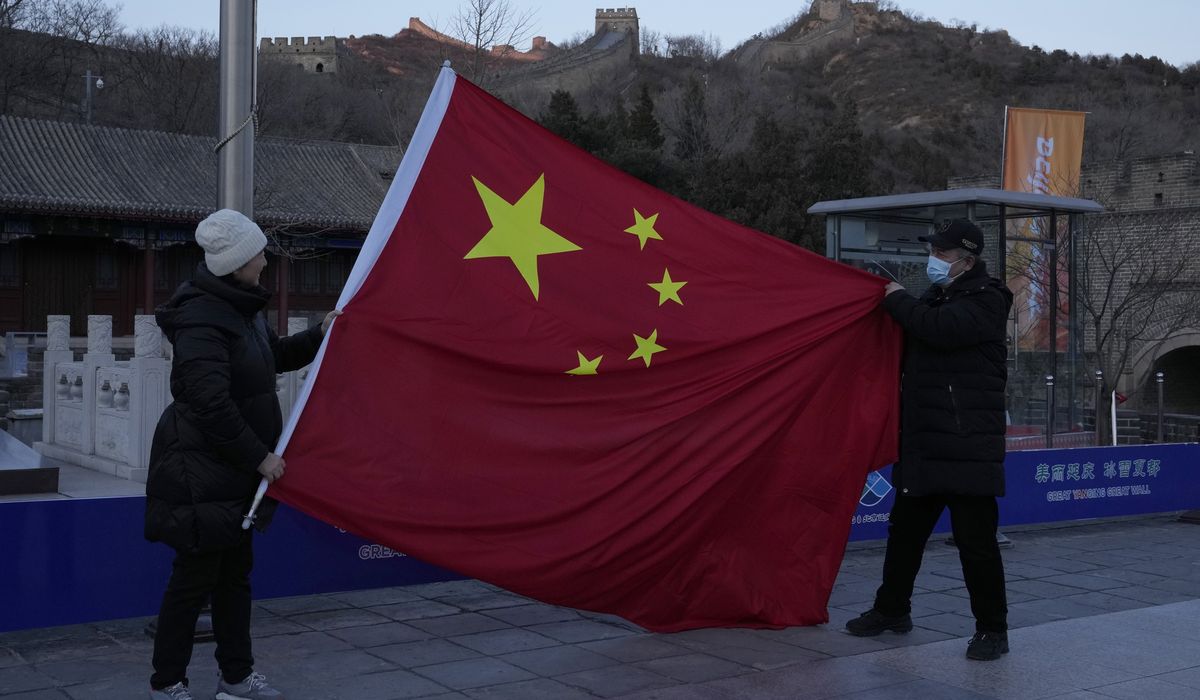
ANALYSIS:
Chinese President Xi Jinping, even after a decade in power, is finding it hard to shape China‘s economy to his liking.
The president and general secretary of the ruling Chinese Communist Party (CCP) spoke frankly to party leaders in an address last month, revealing that despite a massive internal battle he launched against corruption and purges of leading figures both in the government and the private sector, the problem persists to this day.
“We should be aware that the fight against corruption is still raging,” Mr. Xi told a meeting of party’s anti-corruption commission.
A case in point for Mr. Xi’s frustration: the arrest in early November of Sun Lijun, the vice minister of public security, an official with access to the regime’s innermost secrets.
Mr. Sun was arrested on suspicion of accepting bribes. But U.S. analysts said a more likely explanation was his role in mishandling the initial pandemic outbreak in Wuhan, China, and China’s failed lobbying effort to scuttle the prosecution of Malaysia’s 1MDB bank. He also has had no success in repatriating most-wanted exiled billionaire dissident Guo Wengui.
In the January speech, Mr. Xi, who has positioned himself to assume unprecedented third five-year term in office in the world’s most populous state later this year, extolled progress made in reining in systemic corruption within the ruling Chinese Communist Party and its 95-plus million members.
But Mr. Xi’s signature anti-corruption drive remains widely viewed by government officials and China experts as less an effort to produce clean governance than as a cover for efforts to consolidate his power through purging hundreds, maybe thousands, of perceived political rivals.
Since he took power in 2012, critics say, Mr. Xi’s steady reversal of economic reforms imposed since the 1980s is killing off the golden goose of pro-market and modernization innovations that catapulted China to economic superpower status, rivaling the U.S. by some key measures.
Now, as the result of a systematic program of “re-communization,” the Chinese economy is facing widespread dislocation and decline that analysts say could threaten Mr. Xi’s rule and ultimately the Communist Party itself, according to interviews with government and private-sector specialists on China. Even with the pandemic still clouding global forecasts, the World Bank in December downgraded its 2022 forecast for Chinese GDP growth from 5.4% to 5.1%, which would be the third lowest rate since economic reforms first took off in the early 1980s.
“The Chinese economy is rapidly worsening and seems headed towards recession,” said Larry Ong, a senior analyst with SinoInsider, a New York-based risk consultancy that focuses on Chinese elite politics. “Financial contagion is spreading from a debt crisis in the real estate sector.”
The emerging crisis has even led some China analysts to question whether Mr. Xi and the CCP can survive the current economic troubles.
A senior U.S. official who has spent decades studying China affairs said China is slowly disintegrating economically.
About five years ago China passed its peak and in 2015 suffered a stock market crash that caused a $1 trillion run on currency, confronting Beijing for the first time since the 1980s with the fact that the tightly controlled system is fallible.
“They’ve been shaky since and I think they are on the downslope now,” the official said.
Pragmatists vs. ideologues
The decades-long struggle between party pragmatists and ideologues is not new, escalating rapidly after the death of regime founder Mao Zedong in 1976. The internal differences, never fully resolved, again appear to be resurfacing behind the scenes.
Mr. Xi appears intent on ultimately canceling many of the reforms and the opening up of the economy initiated in the 1980s by Deng Xiaoping, an approach that set China on a course of wealth and prosperity and helped underwrite a major military buildup.
An example of the split can be seen in Mr. Xi’s declaration in 2021 of “complete victory” in eradicating poverty. The claim had been publicly contradicted by his own premier, Li Keqian, a year earlier. Mr. Li said in a speech that 600 million Chinese are still earning around 1,000 yuan a month, or about $157 — not enough to rent an apartment.
Analysts interviewed by The Washington Times say there are clear signs opposition to Mr. Xi is increasing but is focused heavily for now on disputes over economics.
Ten years of political purges have left Mr. Xi firmly in control over the so-called power ministries, the internal security forces and the military. But that near-total control over all aspects of Chinese society and economy in the hands of one leader poses its own risks for the president if he steers the economy into the rocks.
Mr. Xi, some analysts say, faces a no-win dilemma: If he gives a free hand to the private business sector that has fueled the country’s enormous economic success, he will weaken the CCP’s iron grip on power. But if he expands and intensifies a campaign targeting the billionaires behind companies like Alibaba, Tencent and others, the economy as a whole could suffer the blowback.
If, as likely, he follows the path of previous communist dictators and reins in the free market, Mr. Xi can expect to set a stifled semi-private economic sector as political controls tighten.
And personal and regional power rivalries against re-communization continue to complicate Mr. Xi’s agenda and could result in China lurching into a full-blown economic meltdown.
Analysts say an economic collapse in China would take place much slower than, say, the 2008 U.S. financial crisis, which was set off by the collapse of investments in risky, poorly regulated real estate loans. In Beijing, government control means loan defaults can be rolled over and payments delayed for as long as government overseers allow. As one observer put it, “A rolling loan gathers no loss.”
But a slower crash than would take place in a capitalist economy is a crash nonetheless.
Targeting billionaires
The economic warning signs for investors include the regime’s campaign of sidelining of wealthy Chinese who led some of the country’s best-known and most successful enterprises and international conglomerates.
Jack Ma, China’s outspoken billionaire founder of the tech giant Alibaba and the financial partner Ant Group is a case in point. Mr. Ma was once rated as China’s richest man and a source of national pride — until he spoke out against government financial regulators and said Chinese banks operated with a “pawnshop” mentality.
China‘s regulators quickly turned on Mr. Ma and effectively ordered the dismantling of his financial empire. State-controlled media outlets, which once celebrated his accomplishments, began referring to him as an “evil capitalist” and “blood-sucking ghost.”
Alibaba was fined nearly $3 billion and an initial public stock offering of Ant, expected to raise $37 billion, was blocked by Mr. Xi.
Other Chinese business giants have also been punished, sidelined or simply disappeared, with real consequences for the companies they created. Since the crackdown, neither Alibaba nor the social media giant Tencent are even in the top 10 most valuable tech companies in China.
Mr. Xi has justified the economic crackdown as part of efforts to promote “common prosperity” and rein in soaring wealth inequality rates in what is still nominally a communist country. But others see it as ideologically-driven revenge against successful businesses who cannot be kept reliably under government control.
China‘s economic challenges were again on display last fall when the country was hit by nationwide power outages that began in September when the government abruptly turned off the electricity in at least 20 and as many as 33 provinces. The cutoffs left millions without lights, elevator service, traffic signals and other services.
The power shortages were the result of a combination of rising coal prices and government-mandated energy cuts to reduce carbon emissions. The shortages led Beijing to increase the use of coal for electricity-producing plants.
And in the politically sensitive real estate sector, a professor at the Central University of Finance and Economics wrote online last month that over 200,000 people stopped making mortgage payments at the beginning of the year and were sued by four major Chinese banks, Radio Free Asia reported Jan. 21. The professor, Han Fuling, quoted one bank lawyer as saying “so many people have stopped their mortgage payments. We were exhausted after sending [that many] attorney letters.”
The payment stoppage was the result of a drop in real estate prices and growing unemployment last year.
China’s commercial real estate sector is perhaps the most worrisome sign of China‘s economic fragility, as regulators and officials confront an estimated $5 trillion debt bubble run up by property developers and real estate speculators, a bubble that many fear is pop.
More signs of economic distress; Salaries of government workers throughout China also are being slashed or in some cases remaining unpaid. Several provincial governments cut civil service employees’ salaries by 25 to 30% along with cutting lucrative government subsidies. Mr. Xi also reduced salaries for party cadres by 33% as part of the general belt-tightening.
The warning signs are multiplying despite the rosy official statistics that appear to show a robust economy and economic growth, and China‘s continuing success as a global exporter is giving Mr. Xi a financial cushion in the face of new challenges..
Former State Department China specialist John Tkacik said China in the last quarter of 2021 logged GDP growth of more than 8% and trade in November produced a large surplus.
“The fact that China continues to have a vice-like grip on global commodities from agriculture to minerals and fossils, tells me that the real estate troubles are manageable — indeed that big losers will be foreign creditors,” Mr. Tkacik said.
China‘s still-strong industrial and defense manufacturing base is overshadowing, for now, the hollowed-out U.S. goods production sector that is struggling to supply and equip American defenses with 21st-century arms.
“China Inc. remains the most robust major economy in the world by far, and state- and party-controlled entities are prospering,” Mr. Tkacik said.
According to Chinese figures, gross domestic product reached $18 trillion in 2021, an increase of about $2 trillion — equal to the GDP of major states like Italy and Canada. Exports grew enormously in 2021 as companies like Amazon and Costco sold vast amounts of Chinese goods.
By contrast, U.S. GDP grew by about 5.7%, though much of that was fueled by record government stimulus spending and subsidies to counter the COVID-19 economic downturn.
But not all outside experts accept China‘s official figures, saying Beijing‘s numbers may be inflated by as much as 4%.
Ominous trends
And some of the middle-term trends are likely to be another source of anxiety for Mr. Xi and his advisors.
The crushing debt crisis in China coupled with a demographic crisis – recent trends show the population is declining sharply – could be compounded by a sharp drop in foreign direct investment as Western corporations seek investment alternatives to China with less political risk.
“We’ve seen reports of how Xi’s mismanagement has destroyed trillions in wealth as he went after tech and network industries, entertainment, home schooling and, of course, real estate,” said the senior U.S. official. “Those staggering losses should be counted against their GDP but it seems as if they were not. In 2022 [Chinese leaders] will be able to add ‘COVID overreaction’ to their list of GDP losses they’ll never get back.”
Michael Wessel, a member of the 12-member congressionally chartered U.S.-China Economic and Security Review Commission, sees rigid Communist Party controls preventing a total collapse of the party-state system that has been in place since 1949.
“History has shown that you can’t trust China’s economic statistics,” said Mr. Wessel said. “While their economy is facing stresses from burgeoning debt, demographic changes, misguided economic policies and other challenges, the iron hand of the leadership has stifled public debate and Xi and the CCP appear to only be tightening their grip on the economy and companies.”
Mr. Wessel called the problems in China “an increasingly precarious situation” for foreign companies that for decades flocked to do business and set up operations in the country as its modernized. Hopes that China would develop into a “normal” market economy playing by the rules of the international liberal order have been dashed under Mr. Xi.
“The CCP is not going to be changing direction and we have to deal with that reality rather than hoping that China’s economic problems will lead to reform.”
Inflection point
Longtime China analyst Gordon Chang sees Beijing facing a critical inflection point, one dramatized by the headline0generating debt problems of real estate development giant Evergrande Group in 2021.
“There is, most critically, a debt crisis. Evergrande Group, the failing developer, and more than a dozen other property companies have missed bond and other payment obligations since September,” he said.
Beijing since 2008 accumulated too much debt to finance its supercharged growth rates and now Chinese businesses and the consumers “face a reckoning,” Mr. Chang said.
“Although Beijing can drag out the process of unwinding loans and payment obligations for a while, the regime cannot avoid a crisis because China has accumulated indebtedness approaching, by some estimates, a staggering 350% of gross domestic product,” he said.
Mr. Xi’s critics say the best strategy for the United States right now is to avoid another Western bailout of the communist system in China, as has happened several times in the past. The Biden administration has made competing with China a pillar of its foreign policy, recognizing that Chinese economic expansionism poses a political and ideological danger threatening the global democratic free market system.
Miles Yu, a former State Department official who played a key role in tougher U.S. policies toward China during the Trump administration, said China’s communist system flourished because it was allowed to take part freely in a global capitalist system.
“The paradox of a communist nation fully participating in a largely capitalist system has enriched and strengthened the Chinese Communist Party to the point where Beijing poses the mortal threat to the United States and to the very international free market economic system that has enabled the rise of the communist state,” he told a congressional China commission last year.
Mr. Yu said the United States should adopt a reciprocal “negative list” similar to the one used by China to block or allow foreign investment.
“A reciprocal response would prohibit Chinese investments in the United States in areas such as high-quality agricultural seeds, social surveys, humanities and social science research institutions, critical minerals mining, news organizations, radio and television productions, film studios, cinemas and theater chains, and cultural performance troupes,” he said.
“We don’t need to defeat [China],” observed the senior U.S. official said. “We just need to defend what is most precious to us until they defeat themselves. It’s how we killed the USSR.”







